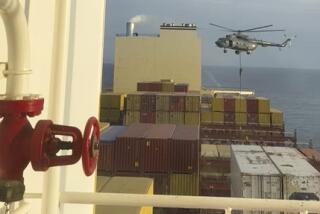British caught in a painfully familiar scene
- Share via
LONDON — A disconcerting sense of deja vu surrounds Iran’s capture of 15 British sailors and marines on smuggling patrol Friday in the Persian Gulf.
Three years ago, eight British servicemen traveling in small boats up the Shatt al Arab waterway near the Iranian border with Iraq found themselves surrounded by members of Iran’s Islamic Revolutionary Guard, arrested and subjected to a three-day ordeal that included mock executions and a visit to what they thought would be their graves. After a few days, they were released.
The previous incident raises concerns here over what the captured sailors and marines may be going through, and has also raised questions about the rules of engagement that do not allow British military officers on smuggling patrol in the Persian Gulf to return fire when confronted, a former senior navy official said Saturday.
“I think if we’re going to be operating in those waters and something like this happens, we have to think very carefully about, rather than being de-escalatory, stepping back and turning the other cheek, whether we should be responding in some different way,” Alan West, who commanded the British navy during the June 2004 incident, said in a telephone interview.
“It’s completely outrageous for any nation to go out and arrest the servicemen of another nation in waters that don’t belong to them,” he said.
In both cases, Iranian officials said that British servicemen were operating in Iranian waters -- a charge that Britain has strenuously denied.
The captives in 2004 appeared blindfolded on Iranian television and apologized for entering Iran’s territory. “Our team of three boats and eight crew entered Iranian waters by mistake. We apologize because this was a big mistake,” Sgt. Thomas Harkins said in the broadcast as carried on Iranian television and translated by British news agencies.
But West said the current capture seemed more serious than the 2004 incident, which he said appeared to be the result of a local Iranian commander who had “overreacted, and done something he shouldn’t have done.”
“Although they treated our people outrageously, blindfolding them, staging mock executions, making them think they were digging their own grave, in the end after about three days, they got to Tehran and let them go,” he said.
In the present case, he said it was worrying that the captives appeared to be already in Tehran, and he pointed to “a statement from the Iranians that this is a suspicious and aggressive action.” That suggests high-level official involvement, he said.
“What our people are doing in Iraqi waters is what they’ve done every day for the last three years,” West said. “Why should all of a sudden torpedo gunboats go out and surround them? It’s bizarre, and it makes me fear that there’s more to it, and it’s tied to something more serious in light of the current situation.”
One of the 2004 detainees, Marine Cpl. Christopher Monan, said his group was traveling in three small boats from the Iraqi port of Umm al Qasr to Basra.
“At the time, we didn’t realize it was the Iranians. It was quite a mixed batch of uniforms,” Monan, 29, said in a telephone interview.
The sailors were taken to a barge in a small inlet on the Iranian side of the Shatt al Arab, blindfolded, relieved of their gear and then moved by boat to a compound not far away, where they were questioned over the next two days, he said.
“There were two higher-ranking guys who got the majority of the questions thrown at them,” Monan said. “What were we doing? Some of them were just random questions, like where did we go to school. Parents’ names, home addresses, things like that. But the major things they were trying to get were what were we doing in the area, what our mission was, how often we went to areas like that.”
Monan said the captives were “treated fairly well,” and were subjected to no physical abuse.
But they were subject to mental abuse, he said.
“There were the mock executions. Basically, they were taking us from one of the rooms to the toilet, and when you’d turn you’d hear the cock of their weapon, and them laughing, and then they’d carry you on,” Monan said.
A televised clip showed the men walking blindfolded through the desert, he said, and they were later forced into a ditch. There, they heard the cocking of weapons from the edge, as if the pit was intended as their grave.
“It was just a rough time,” said Monan, who is still on active duty. “Trying to work out in your head where you were. We weren’t really sure about anything.”
More to Read
Sign up for Essential California
The most important California stories and recommendations in your inbox every morning.
You may occasionally receive promotional content from the Los Angeles Times.










